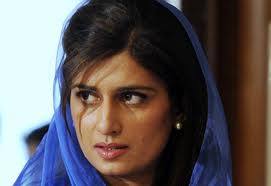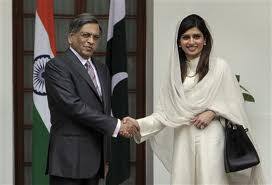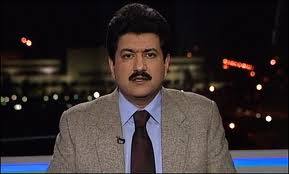Peace Watch » Editor's Take » Hina Rabbani Talks Kashmir?
Hina Rabbani Talks Kashmir?
 Ostensibly, there is an upswing in India and Pakistan relations.The frequency of visits at ministerial, officials, traders, cultural and journalistic levels between the two countries during past couple of years has multiplied. True, not much an importance is attached to these visits by the satellite channels and the print media in New Delhi. Nevertheless, if one goes by the amount of enthusiasm shown by major Pakistan satellite channels and English press it seems Pakistan elite is more eager than their Indian counterparts are for improving trade and cultural relations between the two countries.
Ostensibly, there is an upswing in India and Pakistan relations.The frequency of visits at ministerial, officials, traders, cultural and journalistic levels between the two countries during past couple of years has multiplied. True, not much an importance is attached to these visits by the satellite channels and the print media in New Delhi. Nevertheless, if one goes by the amount of enthusiasm shown by major Pakistan satellite channels and English press it seems Pakistan elite is more eager than their Indian counterparts are for improving trade and cultural relations between the two countries.
Some voices in Pakistan on this issue have become shriller than ever before. Columnists and political analysts like Shahzad Chaudhry, Ayesha Sidiq and Beena Sarwar including some former diplomats and generals have been vociferously and ferociously calling for ‘exorcising’ the Pakistan’s relations with India from the ‘haunting security concerns’ and tuning them to trade, commerce and cultural exchanges. So far, the ‘security concerns’ have been major determinants of Pakistan’s foreign policy. Abdul Sattar former Pakistan Foreign Minister says, “The contours of Pakistan’s foreign policy were shaped by desperate need for arms to ensure the security of the new state and for funds to finance its economic development.” India has been at the centre around which Pakistan has been largely shaping its foreign policy. Seen in right perspective South Asian politics in fact has revolved around hostility between the two countries. Scholars like Howard Wriggins, besides identifying ‘Pakistan’s overriding concern vis-à-vis fear of India’s size, the size of its army—and fear compounded out of not infrequent public statements by prominent Indian’s regarding the tragedy of partition and reiterating the inherent unity of the Indian sub-continent” as cause of tension in the region have been seeing the Kashmir as the main cause of conflict in the region.
 ‘Can the two countries move from their enduring rivalry and make peace’ has been a big poser. In fact, this question has been dominating the official discourses in Islamabad and New Delhi from the very beginning. India and Pakistan were born, as independent countries on a note of ‘suspicion’ is a historical reality. This ‘suspicion’ was further strengthened in October 1947, after the birth of Kashmir dispute. Nehru as well as Patil believed that war over Kashmir “would swiftly bankrupt Pakistan.” When India’s High Commissioner to Pakistan Sri Prakasa told Mountbatten that for the sake of peace all round the best thing India could do was to hand over Kashmir to Pakistan. Nehru took serious objection to the suggestion and wrote to the High Commissioner, “The fact is that Kashmir is of the most significance to India…Here lies the rub..We have to see this through to the end…Kashmir is going to be a drain on our resources, but it is going to be a greater drain to Pakistan.”
‘Can the two countries move from their enduring rivalry and make peace’ has been a big poser. In fact, this question has been dominating the official discourses in Islamabad and New Delhi from the very beginning. India and Pakistan were born, as independent countries on a note of ‘suspicion’ is a historical reality. This ‘suspicion’ was further strengthened in October 1947, after the birth of Kashmir dispute. Nehru as well as Patil believed that war over Kashmir “would swiftly bankrupt Pakistan.” When India’s High Commissioner to Pakistan Sri Prakasa told Mountbatten that for the sake of peace all round the best thing India could do was to hand over Kashmir to Pakistan. Nehru took serious objection to the suggestion and wrote to the High Commissioner, “The fact is that Kashmir is of the most significance to India…Here lies the rub..We have to see this through to the end…Kashmir is going to be a drain on our resources, but it is going to be a greater drain to Pakistan.”
In the emerging scenario with voices about not allowing the ‘security concerns’ coming in the way of improving trade relations with India having become louder, the voices like that of Munir Akram former Pakistan Ambassador to UN calling for ‘bolder stance on Kashmir’ have got muffled. The dispute having plagued the relations between the two countries is equally a historical reality. People like Munir Akram believing that a bolder stance on Kashmir based on international principles will not escalate the danger of a conflict but has several advantages that will help in the resolution of the Kashmir and other issues and ushering a lasting peace in the region are now in minority in Islamabad. However, as against this the populists discourse within the ruling elite suggests that Kashmir, which is ‘intractable’ could be allowed to wait and trade and commerce brought to the fore. This discourse drew its sustenance both from the statements made by some top political leaders from the ruling alliance and outside and proceedings of the officially sponsored the Chaophraya Dialogue an Indo-Pak Track-II initiative jointly undertaken by the Jinnah Institute (JI) and Australia India Institute (AII). Ironically, Kashmir has not been part of these track II dialogues. Instead, the reports emanating from the venues of these track two dialogues suggested that India and Pakistan would be freezing Kashmir issue and addressing the “solvable” issues-, Pakistan believes that Siachan and Sir Creek are ‘solvable’. Besides, reports about the two sides debating military to military cooperation, Afghanistan end game- interests of India and Pakistan and improving trade game that there also reports about Pakistan team making it clear that there country was not interested in discussing Kashmir. These reports sparked statements in Kashmir from some important leaders, condemning the move of putting the sixty three year old dispute on the backburner. It also generated a debate in media if Pakistan was really going to freeze Kashmir for next ten years.
 The interview of Pakistan Foreign Minister, Hina Rabbani to Hamid Mir on Geo TV on 21 March 2012 becomes relevant for knowing the truth. On freezing Kashmir, she said:
The interview of Pakistan Foreign Minister, Hina Rabbani to Hamid Mir on Geo TV on 21 March 2012 becomes relevant for knowing the truth. On freezing Kashmir, she said:
“I categorically deny it, and I condemn those who hold this view, it is ridiculous. We have changed the road that leads to resolution of Kashmir issue and other issues that exist with India; the core issue is Kashmir, let me say it categorically. For sixty years we tried to resolve Kashmir by building animosity and hostility, in this we are equally responsible as Indians are. We invested a great deal of energy, time and effort to build hostility against each other instead of this we have taken path of dialogue process for bringing trust to the level that you can solve these issue-the core issue being that of Jammu and Kashmir. I believe that we were in a negative territory so far trust deficit is concerned; it has been brought to zero level. Now there is need to build the trust, first by solving the solvable issues like Sir Creak and Siachen then moving to more serious issues”.
There can be no two opinions that dialogue process is important. The question arises that is it for the first time that a dialogue process has been initiated between the two countries. India and Pakistan have held dialogues since fifties at all levels and with much all seriousness. Of these most remarkable has been between young and brilliant , Zulfikar Bhutto and Swaran Singh. The question that casts doubts on the assertion by Ms. Hina is, if New Delhi is not pursuing what Swaran Singh had described as “Haranum Kaur’s exposure of thigh policy.”…
Filed under: Editor's Take · Tags: Beena Sarwar, Hina Rabbani Kashmir, India and Pakistan, Kashmir, Z. G. muhammad







